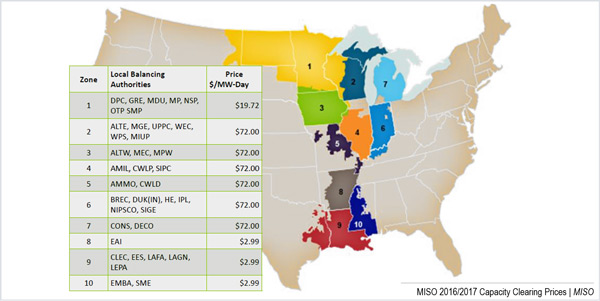By Amanda Durish Cook
FERC dismissed a complaint seeking to overturn the results of MISO’s 2016/17 Planning Resource Auction but ordered the RTO to specify how it calculates the sub-regional transfer constraint in its Tariff.
The commission found the RTO didn’t violate its Tariff when it calculated its sub-regional export constraint for the 2016/17 auction by subtracting firm transmission reservations from the initial 2,500-MW South-to-North transfer limit (EL16-112).
A coalition of MISO transmission customers made the complaint in September, arguing that the RTO’s PRA limits are too strict and drove up clearing prices by trapping capacity in MISO South. MISO defended its method and said it plans to reuse it in future capacity auctions. (See MISO Recommends No Change to Transfer Limits.)
The commission said the RTO acted correctly and that no refunds were warranted. “MISO’s approach considered the [SPP] settlement agreement and the transmission service reservations in the prevailing direction found therein. Despite claims that other approaches could, or even should, have been used, there is no evidence to suggest that MISO’s calculation of the sub-regional export constraint was inconsistent with its Tariff provisions,” the Dec. 6 order said.
However, FERC ordered MISO to specify in its Tariff the methodology used in sub-regional export and import constraint calculations. The commission said the RTO must provide the methodology by the end of January “in order to accommodate the ongoing stakeholder process and allow MISO’s filing to be informed by it.”
Tariff revisions are also to include a formula for going-forward costs. In its complaint, the MISO transmission customers asked FERC to audit offers into the 2016/17 auction, claiming some facility-specific reference levels — which are based on going-forward costs — were too high. FERC declined, saying costs to operate and maintain MISO’s aging generation fleet would naturally rise, but it told the RTO to describe how going-forward costs are established.





